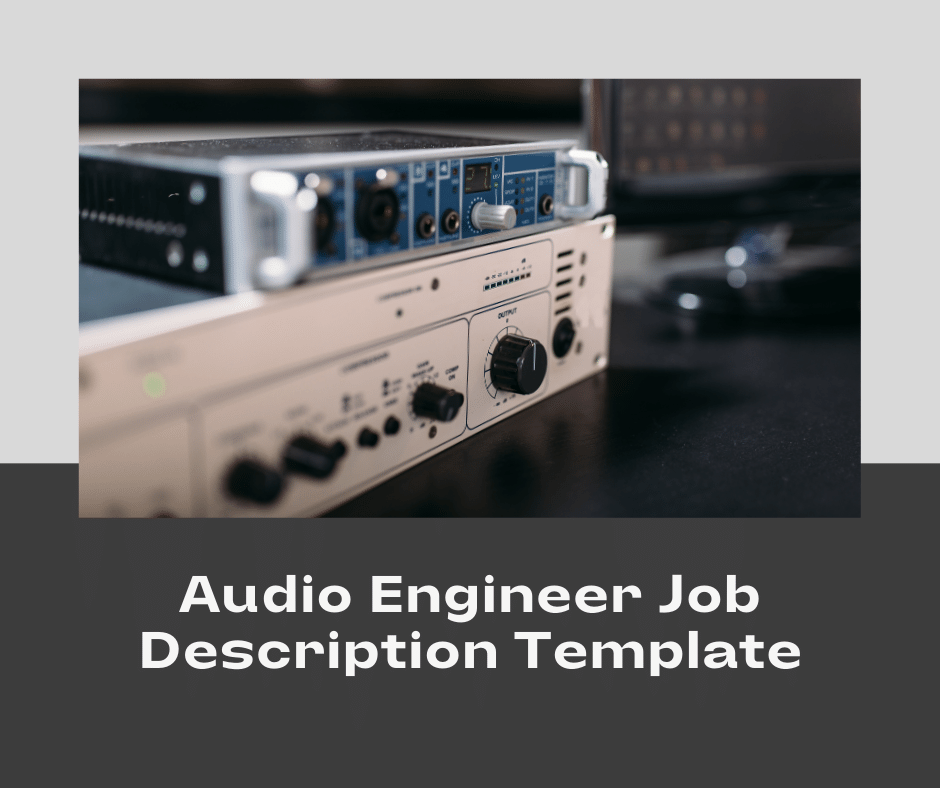
The world of audio is a mesmerising symphony, from the crisp narration of an audiobook to the electrifying energy of a live concert. But have you ever stopped to consider the master behind these captivating soundscapes? Audio engineers, also known as sound engineers, are the technical wizards who capture, manipulate, and sculpt sound to create the sonic experiences we enjoy.
If you’re looking to hire a talented audio engineer to your team, a well-written audio engineer job description is your golden ticket. This blog post will provide you with a comprehensive template, an illustrative example, and a detailed analysis of its sections, ensuring you craft a description that attracts the ideal candidate for your audio needs.
Understanding the Role of an Audio Engineer:
An audio engineer is a skilled professional with a deep understanding of sound technology and the artistic ability to manipulate it. They wear many hats, depending on their specialisation. Here’s a glimpse into their diverse roles:
- Studio Recording Engineers: These studio wizards capture pristine audio of instruments and vocals for music production, podcasts, and audiobooks.
- Live Sound Engineers: They ensure a flawless sonic experience at live events by setting up and operating sound equipment, mixing sound in real time, and troubleshooting any technical hiccups.
- Post-Production Sound Engineers: These detail-oriented specialists work on recorded audio after its initial capture, cleaning unwanted noise, adding sound effects, and balancing the overall soundscape for films, television, and video games.
Now that we understand the different aspects of an audio engineer’s role, let’s delve into the nitty-gritty of crafting the perfect sound engineer job description.
Audio Engineer Job Description Template
A compelling audio engineer job description should be informative, engaging, and targeted. Here’s a template to get you started:
- Introduction: Hook potential candidates with a glimpse into the exciting world they’ll enter. Briefly introduce your company and the impact this role has on your creative endeavours.
- Detailed Responsibilities: Outline the engineer’s duties, categorized by area of expertise (e.g., live sound, studio recording, post-production).
- Skills and Qualifications: Specify the technical skills and experience required. Don’t forget to mention soft skills that contribute to a successful team environment.
- Compensation and Benefits: Transparency is key! Mention the salary range (if possible) and any benefits offered (health insurance, paid time off).
- Call to Action: Clearly instruct applicants on how to submit their resumes and portfolios (if applicable).
Sample Audio Engineer Job Description Template:
Title: Audio Engineer
Location: [City, State]
Company: [Company Name]
About Us: [Brief description of the company and its industry presence]
Responsibilities:
- Record, mix, and master audio for various projects including music production, film, television, radio, and live events.
- Set up and operate recording equipment, microphones, mixing consoles, and signal processors.
- Collaborate with artists, producers, and directors to achieve desired sonic results.
- Contribute to sound design and audio post-production processes.
- Provide live sound reinforcement for events, ensuring optimal sound quality and balance.
- Troubleshoot technical issues and provide solutions in a timely manner.
- Maintain and organize audio files, equipment, and studio spaces.
- Stay updated on industry trends, technologies, and best practices.
Requirements:
- Bachelor’s degree in Audio Engineering, Sound Production, or related field (preferred).
- Proven experience as an audio engineer in a professional setting.
- Proficiency in Digital Audio Workstations (Pro Tools, Logic Pro, etc.) and audio editing software.
- Strong technical skills and knowledge of audio equipment, acoustics, and signal flow.
- Excellent communication and interpersonal skills.
- Ability to work under pressure and meet tight deadlines.
- Flexibility to work evenings, weekends, and holidays as required.
Benefits:
- Competitive salary
- Health insurance
- Retirement plan
- Paid time off
- Professional development opportunities
Remember, this is just a template!
Spice it up by highlighting your company culture, unique projects, or the chance to work with renowned artists. Describe the work environment (studio, live events, etc ), typical hours, and collaboration opportunities. Find top sound engineers by showcasing the exciting possibilities within your team.
If you need some extra help, we’ve got a few other articles we’ve written on this topic:
- Find out what makes a good project brief
- Finding out how much it costs to make music








